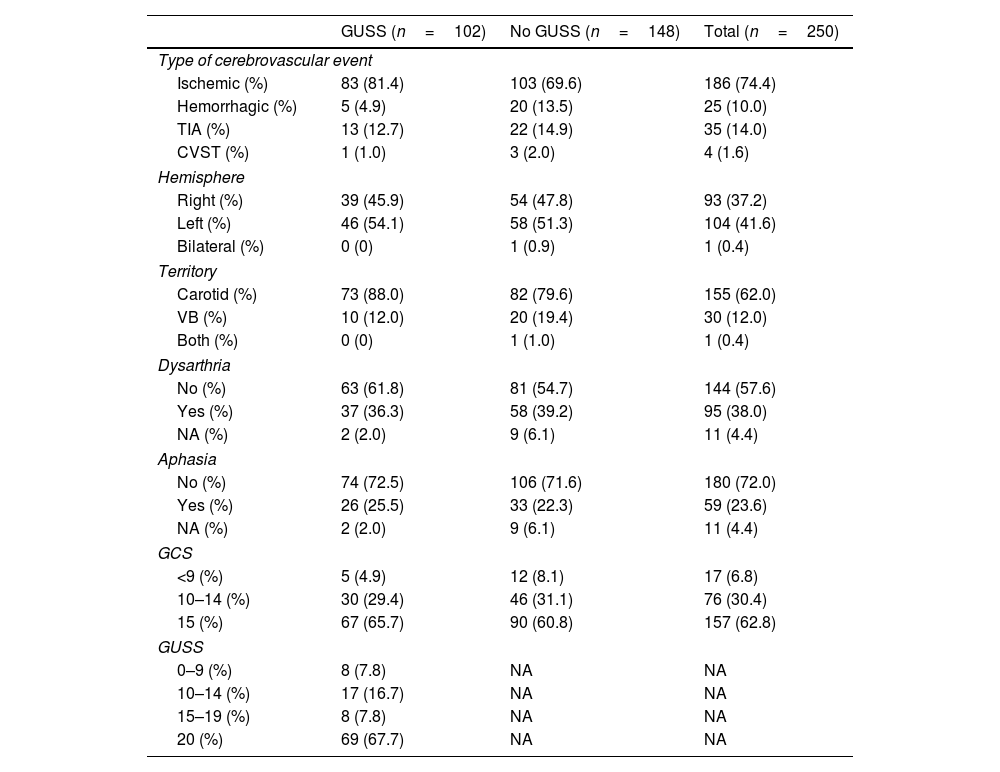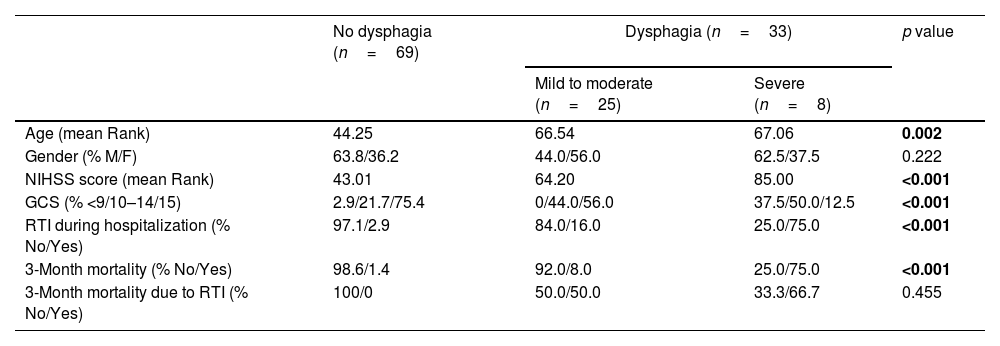Dysphagia is a common post-stroke complication, which may result in serious pulmonary sequelae. Early detection of dysphagia and aspiration risk can reduce morbidity, mortality and length of hospitalization.
ObjectivesThis study aims to identify association between dysphagia and acute cerebrovascular disease, and evaluate the prevalence and impact of pulmonary complications on readmissions and mortality.
Material and methodsRetrospective observational study based on 250 clinical records of patients with acute cerebrovascular disease: clinical history, neurological examination, imaging and Gugging Swallowing Screen in the first 48h. Patients were followed for 3 months via medical records to estimate 3-month mortality and readmissions.
ResultsOut of 250 clinical records analyzed, 102 (40.8%) were evaluated for dysphagia. The prevalence of dysphagia was 32.4%. The risk was higher in older patients (p<0.001), in severe stroke (p<0.001) and in the hemorrhagic subtype (p=0.008). An association was found with dysarthria and aphasia (p=0.003; p=0.017). Respiratory tract infections occurred in 14.4% of all patients (GUSS group 11.8% versus no GUSS group 16.2%), and in 75% of those with severe dysphagia (p<0.001). Mortality at 3 months was 24.2% in dysphagic patients, especially high in the severe dysphagia group (75%, p<0.001).
ConclusionsThe type of cerebrovascular disease, NIHSS and GCS scores, age, dysarthria, and aphasia were significant associated factors to dysphagia. The prevalence of respiratory tract infections was higher in patients with no GUSS record, and no statistical significance was observed in related readmissions. Mortality at 3 months was superior in the severe dysphagia group.
La disfagia es una complicación frecuente posterior a un evento cerebrovascular, que puede provocar graves secuelas pulmonares. La detección temprana de la disfagia y el riesgo de aspiración puede reducir la morbilidad, la mortalidad y la duración de la hospitalización.
ObjetivosEste estudio pretende identificar asociaciones entre la disfagia y la enfermedad cerebrovascular aguda, y evaluar la prevalencia y el impacto de las complicaciones pulmonares en los reingresos y en la mortalidad.
Material y métodoEstudio observacional retrospectivo basado en 250 historias clínicas de pacientes con enfermedad cerebrovascular aguda: historia clínica, examen neurológico, pruebas de imagen y Gugging Swallowing Screen (GUSS) en las primeras 48h. Los pacientes fueron seguidos durante 3 meses a través de las historias clínicas para estimar la mortalidad a los 3 meses y los reingresos.
ResultadosDe las 250 historias clínicas analizadas, 102 (40,8%) fueron evaluados por disfagia. La prevalencia de disfagia fue del 32,4%. El riesgo fue mayor en los pacientes de mayor edad (p<0,001), en el ictus grave (p<0,001) y en el subtipo hemorrágico (p=0,008). Se encontró asociación con la disartria y la afasia (p=0,003; p=0,017). Las infecciones del tracto respiratorio se produjeron en el 14,4% de todos los pacientes (grupo GUSS 11,8% vs. grupo sin GUSS 16,2%), y en el 75% de los que tenían disfagia grave (p<0,001). La mortalidad a los 3 meses fue del 24,2% en pacientes disfágicos, especialmente alta en el grupo de disfagia grave (75%; p<0,001).
ConclusionesEl tipo de enfermedad cerebrovascular, las puntuaciones NIHSS y GCS, edad, disartria y afasia fueron factores asociados de forma significativa a la disfagia. La prevalencia de infecciones del tracto respiratorio fue mayor en los pacientes sin registro GUSS, y no se observó significación estadística en los reingresos relacionados. La mortalidad a los 3 meses fue superior en el grupo de disfagia grave.










